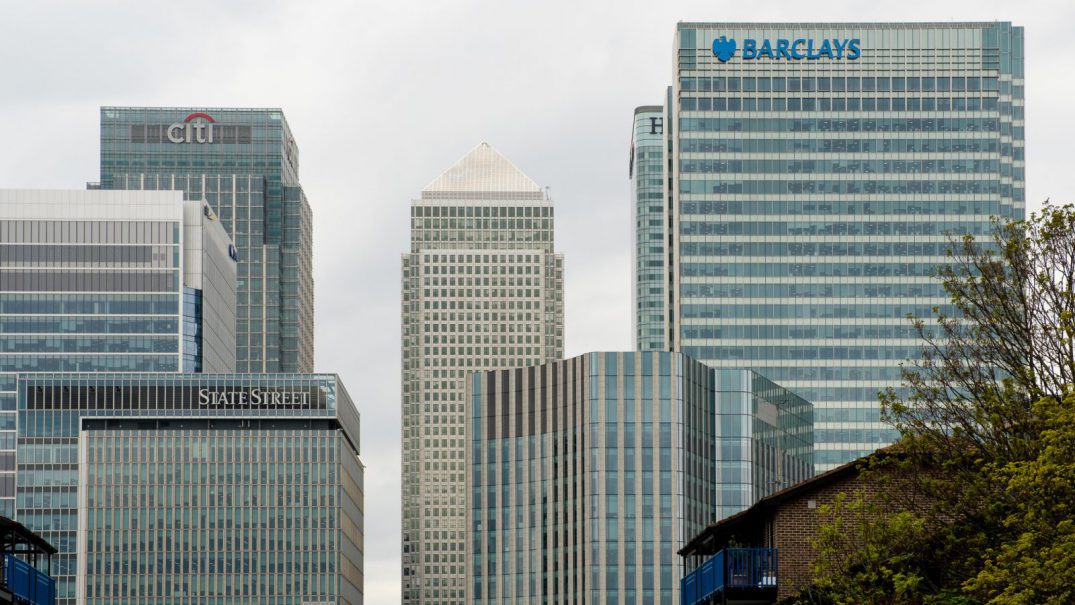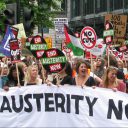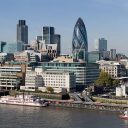Five causes of media amnesia

London – Thames North Bank, Isle of Dogs. alh1 / Flickr. Some rights reserved.
Remember when the banks created the mac daddy of economic crashes? Back in 2008, you would have had plenty of company if you thought the end was neigh for the economic model producing that crisis. You would have been mistaken. In the UK, the political consensus around this model is only now beginning to be questioned, after Brexit, the tragedy of Grenfell and the Carillion and Capital scandals. How was it maintained through a decade of crisis?
There are many factors, not least the grip of corporations on politics – power that intensified rather than receding after the 2008 financial collapse. The mainstream media have also played a major role, one that shouldn’t be underestimated. In particular, media have suffered from an acute amnesia about the causes of the crisis. As it morphed from a banking meltdown to a public debt crisis, blame shifted from greedy bankers and free market ‘casino capitalism’ onto public sectors, immigrants and people who didn’t have much money. This forgetting and misremembering helped make austerity, privatisation and corporate tax breaks seem like common sense responses to the problems. Understanding media amnesia is therefore vital if we are to find a way out of the neoliberal groundhog day in which it has trapped us. With that in mind, here are five factors causing media amnesia.
1. Media barons
It probably won’t come as a shock that British media is controlled by a handful of media barons and corporations. Three firms control 71 per cent of national newspaper circulation and five companies command 81 per cent of local newspaper titles. Rupert Murdoch’s media empire is probably the most notorious, and is currently trying to take full control of Sky plc. Social media may have led to a proliferation of voices online, but the mainstream brands still dominate the online news space. And don’t forget that the new gatekeepers to news like Google and Facebook are themselves giant corporations.
2. Political partisanship
With journalism in the hands of media barons, it is hardly surprising that the mainstream news landscape is skewed to the right. Whether proprietors intervene directly, whether they hire editors whose values reflect their own, or whether journalists censor themselves to fit in with the culture of their title, make no mistake: content will more than likely reflect the interests of proprietors. The right-wing press deliberately manufactured amnesia about the causes of the crisis to bash Labour and back the Tories, and to promote austerity, the shrinking of the social state and the passing of resources from the public to the private sector.
The liberal sections of the press may not have manufactured media amnesia deliberately, but they often reproduced it passively. Because they backed Labour or the Lib Dems during elections, they often ‘retweeted’ the narratives of these parties, especially close to election times. It wasn’t in the interests of either of these parties to dwell on the role of financialisation or corporate capitalism in causing the problems, as no party had any intention of tackling those roots causes. Labour was in a pickle. It had no choice but to take the blame for the crisis, since it had been in power for the past decade. It could either take blame for deregulating and liberalising the economy or it could take blame for overspending. Since it was planning some level of austerity anyway and wasn’t exactly chomping at the bit to take on the 1%, Labour was unable to develop a convincing alternative narrative about the crisis.
3. The Westminster bubble
Regardless of which party their paper backs during elections, senior editors of newspapers have close professional and personal ties with politicians. The same goes for the public service broadcasters like the BBC, which are mandated to be politically impartial. They all live in the ‘Westminster bubble’, meaning that the views and narratives of politicians will shape news content. In my media study, 51% of the sources quoted in the content were politicians and other officials. As stated above, the Tory narrative about wasteful public spending was not being successfully challenged by Labour, so the media would have had to look outside the bubble for other explanations. This they often failed to do, and when they did, they turned to people who were giving out similar messages.
The second biggest group of sources in my study were financial services representatives and the fourth biggest category was business representatives (excluding financial services). Together, politicians, business and finance accounted for around 70% of all sources quoted. And so, those responsible for causing the problems were called upon to make sense of them and offer solutions. Those who might have had more accurate explanations for the crisis – for example campaigners and activists, heterodox economists, or trade unions – hardly got a look in (each accounting for less than 2.5%) . As long as the pool of sources remains confined to politicians and business representatives, the range of views will be limited and analysis will be partial.
4. News values
Media scholars have long been studying the professional values and routines that shape journalism. A major news value contributing to media amnesia is an obsession with the very latest events at the expense of historical context, explanation and process. In my sample, 49% of coverage offered no explanation whatsoever for the crisis. In the vacuum created by the absence of other explanations, the inaccurate ‘public sector profligacy’ narrative was able to become dominant. This was the key justification for austerity.
The social values of journalists might also play a role here. Although there are many kinds of journalists and media outlets, it remains the case that those with staff jobs at established media organisations come from among the elite. They might lean left or right but their interpretations of events and ideas about appropriate responses will likely not be too far removed from those of the politicians with whom they studied at university.
5. Churnalism
Journalist Nick Davies coined the term ‘churnalism’ to describe the state of journalism in the current era. Since the 1980s, media companies have been stepping up their cost-cutting and revenue-raising practices. They have done this to maximise profit in a context of both increased competition in the digital era and increased media privatisation, deregulation and conglomeration. This has put enormous pressure on journalists, who are having to fill an ever widening news hole with fewer resources. Unsurprisingly, this has had an effect on the quality of content, and has led to problems of inaccuracy, cannibalisation, and an unwillingness and lack of time to hold the powerful to account and seek out alternative viewpoints. Thus, the neoliberal era of corporate power and profit-seeking that produced the crisis is also partly responsible for its amnesiac media coverage.
***
Curing media amnesia
To tackle the causes of media amnesia and develop media systems that are fit for purpose, we will first need to tackle the question of ownership. Media oligopolies should be broken up and non-corporate media should be supported. This goes for the social media giants as well as organisations producing media content. Secondly, if the current political system continues to fail to represent the interests of the majority of people, we should rethink whether politicians should get to have such influence on the media narratives we’re exposed to. Certainly, the pool of sources needs to be much broader than politicians and CEOs. Thirdly, diversity should be increased within journalism itself. Fourthly, we as news consumers should ask ourselves questions about what the purpose of news is and what we actually want from news. And finally, we need to understand that the struggle over media is part of the wider struggle over the control of resources at the heart of the 2008 crisis and the aftermath with which we are still living. We need to have a good think about how we want our societies to be organised and what role we want the media to play in them.






